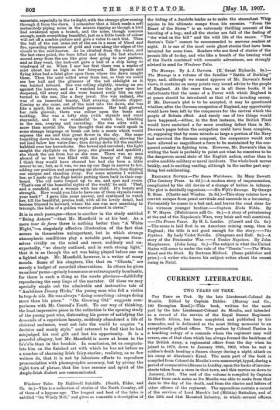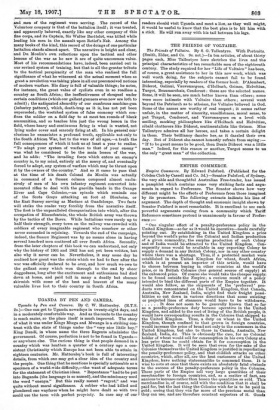CURRENT LITERATURE.
TWO YEARS ON TREK.
Two Years on Trek. By the late Lieutenant-Colonel du Moulin. Edited by Captain Bidder. (Murray and Co., 180 Brompton Road.)—This book, written for the most part by the late Lieutenant-Colonel du Moulin, and intended as a record of the service of the Royal Sussex Regiment. in South Africa, has been completed and published by his comrades, and is dedicated as the most fitting memorial to an exceptionally gallant officer. The preface by Colonel Panton is a touching eulogy of a comrade whom the regiment may welt revere, one of that class which has always formed the backbone of the British ,Army, a regimental officer from the day when he joined in 1879, down to January 28th, 1902, when he met asoldier's death heading a Sussex charge during a night attack on his camp at Abraham's Kraed. The main part of the book is compiled from Colonel du Ilioulin's own manuscript,typed, during a period of comparative idleness in Lindley, upon the backs of invoicesheets taken from a store in that town, and this carries us down to January, 1901. The rest of the volume is compiled by Captain' Bidder from such notes as Da Moulin was able to make from that date to the day of his death, and from-the diaries and letters of other officers of the regiment. The appendices contain a record of the services of Lord March's 3rd (Militia) Battalion, and of the 13th and list Mounted Infantry, in which several officers
and men of the regiment were serving. The record of the Volunteer company is that of the battalion itself ; it was treated, and apparently behaved, exactly like any other company of this fine corps, and its Captain, Sir Walter Barttelot, was killed while leading his men in the assault upon Fetid's Nek. Among the many hocks of the kind, this record of the doings of one particular battalion stands almost apart. The narrative is bright and clear, and Du Moulin's own reflections upon the tactical and other lessons of the war as he saw it are of quite uncommon vane. Most of his recommendations have, indeed, been carried out in our revised system of training, but that is all the greater tribute to the tactical perspicacity of the man who realised the full significance of what he witnessed at the actual moment when so great a revolution was taking place in all our preconceived notions of modern warfare. His diary is full of valuable things ; he notes, for instance, the great value of cyclists even in so roadless a country as South Africa; the ineffectiveness of shrapnel under certain conditions (which our gallant gunners even now are loth to admit); the antiquated absurdity of our cumbrous machine-gun (infantry pattern), which, death-trap as it is, has not yet been superseded; the Wretched system of false economy which confines the soldier on a field day to at most ten rounds of blank ammunition, and so teaches him just the wrong lesson in the field, where heavy and continuous firing is what is wanted, not lying under cover and scarcely firing at all. In his general conclusions he enunciates a profound truth, applicable not only to the South African War, but to the wars of all ages,—a truth the full consequences of which it took us at least a year to realise. "To adapt your system of warfare to that of your enemy" was what he considered to be the main lesson of the war, and he adds: "The invading force which enters an enemy's country is, to my mind, entirely at the mercy of, and eventually forced to adopt, any system of warfare which may be thrust upon it by the owners of the country." And so it came to pass that at the time of his death Colonel du Moulin was actually in command of a Sussex column composed almost exclusively of men of his own infantry regiment converted into mounted rifles to deal with the guerilla bands in the Orange River and Cape Colonies,—an episode which reminds one of the Scots Greys attacking on foot at Blenheim, or the East Surrey serving as Marines at Guadeloupe. Two facts will strike the reader very forcibly from the narrative itself. The first is the unparalleled disorganisation into which, after the occupation of Bloemfontein, the whole British army was thrown by the tactics of the Boers. While battalions were rarely up to half their strength, every town on the railway was crowded with soldiers of every imaginable regiment who somehow or other never succeeded in rejoining. Towards the end of the campaign, indeed, the Sussex Regiment was by no means alone in having several hundred men scattered all over South Africa. Secondly, from the later chapters of this book we can understand, not only why the history of 1901 and 1902 has not yet been written, but also why it never can be. Nevertheless, it may some day be realised how great was the crisis which we had to face after the war was officially declared to be over, and how much we owe to the gallant army which won through to the end by sheer doggedness, long after the excitement and enthusiasm had died down at home, and paid toll in many a deadly but obscure skirmish with some of the best and bravest of the many valuable lives lost to their country in South Africa.







































 Previous page
Previous page